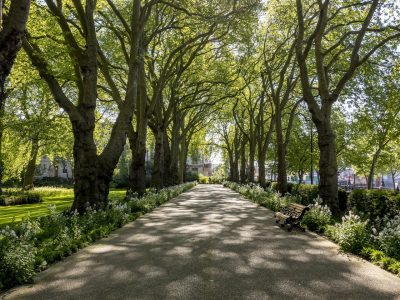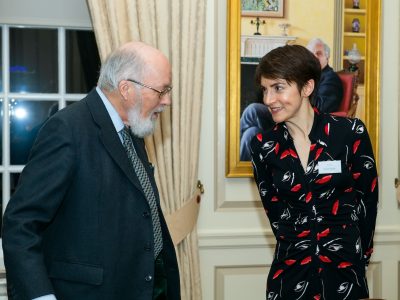
2022 Book Prize Award Ceremony
Held on 23 February 2023, sponsored by Wildy & Sons Limited
Speech by Master Treasurer
Master Rosalyn Higgins, fellow Benchers and members of The Inner Temple, distinguished Book Prize finalists, ladies and gentlemen, I am delighted to welcome you all to the fifth of our triennial Inner Temple Book Prize.
Master Kenneth Olisa is sadly unable to be with us due to illness, but I am delighted to come off the bench to present the prizes for our Inner Temple Book Prize whose reputation goes from strength to strength.
In 2011, as the Inn’s Royal Treasurer, HRH was asked to be Patron of the Prize and wrote this in the Prize’s prospectus:
It was first awarded in 2008 as part of the Inn’s celebrations to mark the 400th anniversary of the grant by King James I of the Temple’s Royal Charter and which acknowledged what was already by then a centuries old tradition of Legal education.
This prize maintains that commitment by encouraging scholarly contribution to the understanding of the law as administered in England and Wales.
I congratulate The Inner Temple on this worthy venture which I am confident will grow in reputation and stature as it becomes a permanent feature in our legal landscape.”
“I congratulate The Inner Temple on this worthy venture which I am confident will grow in reputation and stature as it becomes a permanent feature in our legal landscape.”
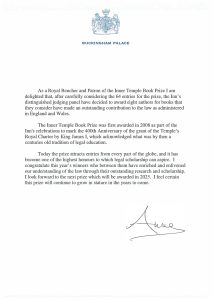
The Inn’s Royal Charter lays down for all time the Inn’s responsibility to practice and teach the law, and it is evident to a visitor to The Inner Temple today that the Inn continues to honour this commitment made 400 years ago.
As the Treasurer of the Inn, I am proud of all that Inner Temple is doing to engage with the training of barristers at home and abroad. We have a truly international reach. Since 2019 Call nights feature students from 50 countries around the world. So, we make a real contribution to the maintenance of the rule of law in the common law world.
“I am proud of all that Inner Temple is doing to engage with the training of barristers at home and abroad. We have a truly international reach. Since 2019 Call nights feature students from 50 countries around the world. So, we make a real contribution to the maintenance of the rule of law in the common law world.”
The Inner Temple supports our members throughout their professional careers, from their student days through to their service as judges with lectures, seminars, debates, advocacy classes and other activities which in fulfilment of the Inn’s obligation and commitment to legal education. Long gone are the days when a barrister’s education consisted of a moot organised by Master Reader and a series of dinners… even if we have happily not given up the social side of our activities! The new education and training facilities, where we are now, provide an excellent environment for learning and are well equipped to support hybrid events thereby improving accessibility and inclusivity. We have responded to regulatory reform with developments to its qualifying sessions, justly praised by the BSB, alongside provision of new practitioner training. I am also proud of our evolving programme of educational events for established barristers, ranging from practical career advice to developing communication skills and dealing with distressing material.
Perhaps the most important and remarkable contribution to all this is given by the Benchers and members of the Inn who freely give up their spare time to share their knowledge and skills with our more junior members and students. It is the basis of an ethical reputation, standard of excellence and mutual support for which the Bar is justly renowned throughout the world.

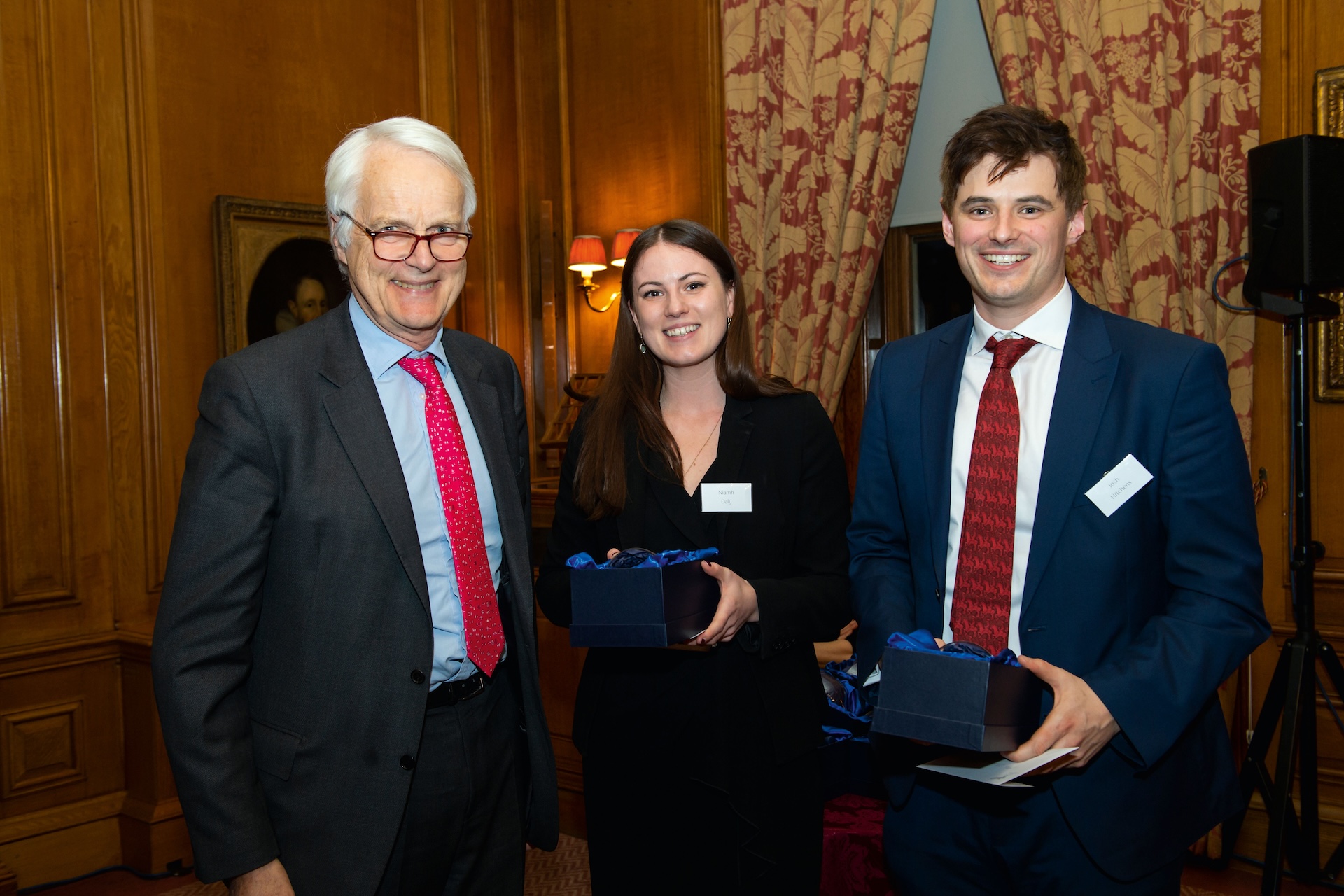
So, to why we are here this evening. The Book Prize is one of several initiatives undertaken by Inner Temple to strengthen our links with those organisations, publishers and universities who, between them, are at the heart of all that is best in legal education. The ties between the practising Bar and the academic legal world are deep and important to both.
May I therefore add my thanks to the 64 entrants for submitting their books which the judges noted were of an exceptionally high standard, the 61 Benchers and members who between them read each one carefully, the short-listing panel chaired so efficiently by Master Bernard Rix with wisdom and guidance, all those who have worked tirelessly on the administration of the prize, but most of all, the short-listed authors themselves, whose commitment to the highest standards of legal authorship resonate with all The Inner Temple does.
Thank you.
–
Sir Robert Francis KC
Master Treasurer
–
Speech by Master Rosalyn Higgins
Master Treasurer, fellow Benchers, members of The Inner Temple, distinguished Book Prize winners and runners-up, ladies and gentlemen, I begin by immediately saying that I am standing in for Sir Bernard Rix, (the driving force over the years behind the Book Prize) who is very disappointed not to be able to be here tonight.
This is a very special occasion, in which all who have been involved in the 2022 Inner Temple Book Prize can meet together to celebrate the prize winners.
This is a very special occasion, in which all who have been involved in the 2022 Inner Temple Book Prize can meet together to celebrate the prize winners.
You have heard from the Treasurer about the origins and purpose of the Book Prize. The Book Prize is an important element in the Inn’s place in the world of legal education. At the heart of the rather detailed Rules of Entry is the following: “The criterion to be applied in deciding on the award of prizes is the extent to which the book makes an outstanding scholarly contribution to the understanding of the law as administered in England and Wales”.
If that phrase seems to narrow eligibility, it is immediately followed by these words: “subject to that consideration, works dealing with international law, comparative law, the law of the European Union, the Commonwealth or other international organisation, legal history, legal philosophy, sociology of law, or criminology and the treatment of offenders will be eligible for consideration”.
Master Treasurer, you may imagine that some of the entries we honour this year have required some rather careful scrutiny of these eligibility criteria!
The prize winners and runners-up can feel special pride in the fact that their books have passed not only stiff competition, but also the rigorous examination of the Judging Panel. Your contributions have been judged by a retired High Court Judge, two retired Justices of the Court of Appeal, two current members of the Court of Appeal, a former President of the International Court of Justice and three leading academic practitioners. Not an easy panel, our authors might feel.
The Inner Temple Book Prize has become well known, and much valued, by publishers and writers alike. The panel reads every single book that is long-short listed. This time we had 64 entries, and obviously to read each and every one of these is not possible. We owe a debt of great gratitude to the 61 Benchers and members of the Inn who volunteered at the initial phase to read an entry and we are very pleased to see some of them here tonight. Every single entry was carefully read and marked by reference to specified criteria; enabling the panel, after reading each of these assessments, to agree upon a long-short list at its first meeting.
Given the breadth of expertise of the panel members, there is usually a pool of knowledge on the subject matter of most submitted books. But each member will read every single shortlisted book, whether or not it is about a familiar subject matter. You may imagine that this is a very heavy task. When filling our wheeled suitcases with a pile of hugely varied books, we could be forgiven for feeling somewhat daunted about what lies ahead. But then we can only feel ashamed as we receive the email circulated by Professor Sir John Baker, saying “Can’t wait…”
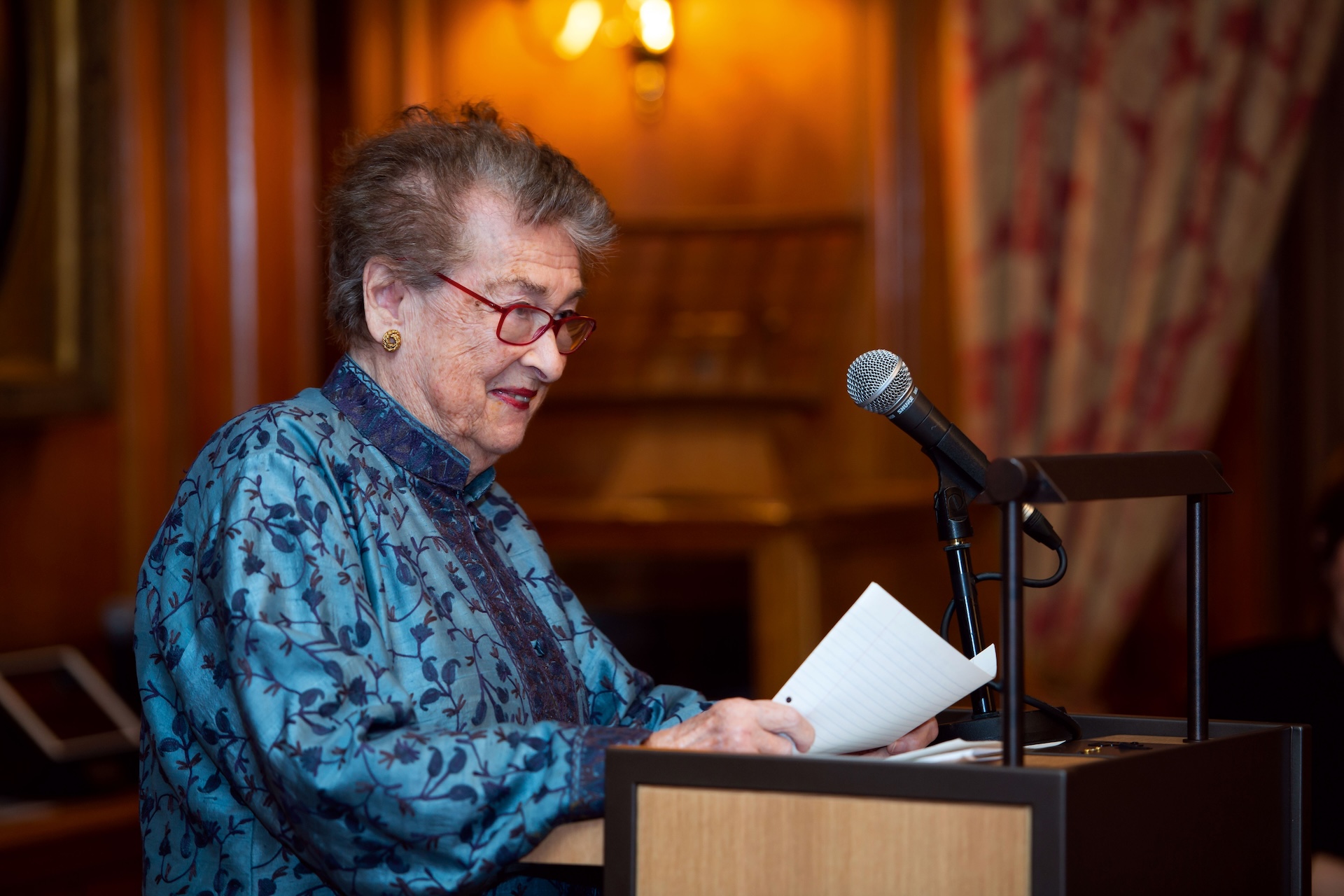
Then there is yet more reading, in which your magnum opus is assessed in a written commentary. The panel meets again, the leading contenders start to emerge, and we each take away any books we have not yet read. Again, written views are sent in. Master Rix then has the job of making some sense of it all. Further meetings, discussions, reading and eventual voting then follow. For you to have come through as winners and runners-up is a very considerable achievement.
This year the merits of Professor Jo Braithwaite’s book The Financial Courts and Professor Neil Duxbury’s book The Intricacies of Dicta and Dissent could not be separated, and so, very unusually, we have joint winners of the Main Prize. We found Professor Braithwaite’s examination of a specialised subject – a technical study on an important and growing subject – not only scholarly but also accessible and interesting for the non-specialist. We found impressive analysis and persuasive interpretation of the International Swaps and Derivatives Association Agreement. Each chapter was well footnoted and clearly presented cutting through financial jargon and complexities.
It is a great shame that Professor Duxbury cannot be with us this evening. His book is essentially designed to get judges thinking about the legal implications of what they say in their written judgments. It contains fascinating insights into current practice in a variety of courts and is rooted in a deep, deep knowledge of English case law. What weight may dicta have in a later judgment, or should reference be made only to the ratio decidendi? Huge knowledge must have been required to know where to go for examination of different dicta. Dissents, the other part of Professor Duxbury’s book, are more easily ascertainable. Each of us admired the scholarship and depth of thinking, some being especially appreciative of the part on dicta, and others of the part on dissents.
As for Dr Bell’s winning entry in the New Authors’ category, I think I don’t disclose too much when I say there was a high degree of agreement on The Anatomy of Administrative Law as the winner. The study was rooted in serious scholarship. The underlying theme that there is no single principle guiding the development of administrative law is rigorously tested in well selected cases against a range of criteria. It was hard for us to believe that this was indeed written by a ‘new author’.
So, we congratulate the prize winners and also the runners-up in each of the categories. In the New Authors’ category Joshua Hitchens and Niamh Daly for Forced Marriage Law and Practice, and Dr Richard Martin Policing Human Rights: Law, Narratives and Practice; and in the Main Prize category Professor Barber for The Principles of Constitutionalism, and Professor Richard Helmholz for The Profession of Ecclesiastical Lawyers.
I know that Master Rix, for whom I am standing in, would not wish me to conclude my remarks without thanking his fellow panellists for all their hard work. And warm thanks are also due to Celia Pilkington, The Inner Temple Archivist, who was our contact with publishers and ensured that we each had the books we needed at each stage of proceedings and stood ready to answer every question we had. And our appreciative thanks too to Rob Hodgson, our Librarian and Keeper of Manuscripts, who kept meticulous track of absolutely everything.
–
Her Excellency Dame Rosalyn Higgins GBE KC JSD FBA
Master of the Bench
–
MAIN PRIZE WINNER AND RUNNERS UP
Joint Winners of the £12,000 Inner Temple Book Prize
Professor Jo Braithwaite
The Financial Courts: Adjudicating Disputes in Derivatives Markets (Cambridge University Press)
Professor Neil Duxbury
The Intricacies of Dicta and Dissent (Cambridge University Press)
Runners up
Professor Richard Helmholz
The Profession of Ecclesiastical Lawyers: An Historical Introduction (Cambridge University Press)
Professor N W Barber
The Principles of Constitutionalism (Oxford University Press)
NEW AUTHOR’S PRIZE WINNER AND RUNNERS UP
Winner of the £5,000 New Author’s Prize
Dr Joanna Bell
The Anatomy of Administrative Law (Hart Publishing)
Runners up
Joshua Hitchens and Niamh Daly
Forced Marriage, Law and Practice (Bloomsbury)
Dr Richard Martin
Policing Human Rights: Law, Narratives and Practice (Oxford University Press)
JUDGING PANEL
- Professor Sir John Baker KC LLD FBA
- The Rt Hon Lord Justice Dingemans
- The Rt Hon Sir Patrick Elias
- The Rt Hon Dame Elizabeth Gloster DBE
- Her Excellency Dame Rosalyn Higgins GBE KC JSD FBA
- Nigel Pleming KC
- The Rt Hon Lord Justice Popplewell
- The Rt Hon Sir Bernard Rix
- Professor Cheryl Thomas KC (Hon)
- Professor Leslie Thomas KC Sir Michael Tugendhat
